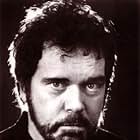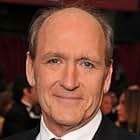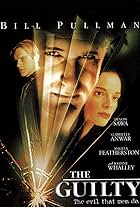AVALIAÇÃO DA IMDb
6,0/10
2,9 mil
SUA AVALIAÇÃO
Adicionar um enredo no seu idiomaA NY litigator, hired to defend a murderer avenging his son's death, grapples with his own ambitions and the moral imperative of his client's truth-seeking.A NY litigator, hired to defend a murderer avenging his son's death, grapples with his own ambitions and the moral imperative of his client's truth-seeking.A NY litigator, hired to defend a murderer avenging his son's death, grapples with his own ambitions and the moral imperative of his client's truth-seeking.
- Prêmios
- 1 vitória no total
Joseph Mosso
- Bartender
- (as Joe Mosso)
- Direção
- Roteiristas
- Elenco e equipe completos
- Produção, bilheteria e muito mais no IMDbPro
Enredo
Você sabia?
- CuriosidadesAccording to his diaries, Alan Rickman turned down a role in this movie
- Erros de gravaçãoThe prosecutor asks for sauerkraut and mustard on his hot dog, but they aren't on it.
- Citações
Jack Renoble: A cynic is an idealist who's been disappointed.
Avaliação em destaque
Just when you tire of seeing seamy, disspiriting tales of outlawry and big-budget, small-brained extravaganzas, a film like The Confession comes along to, well, renew your faith that the medium of film can deliver something uplifting and thoughtful without getting smarmy and preachy.
Kinglsey is simply a masterful actor no matter what he does. Watch his every gesture and expression, for each is intentional. Baldwin's social conscience tends to steer him to movies with messages, and this is no exception. Viewers should go in expecting actual morals to the story--such a rarity these days.
Baldwin plays a hot-shot defense lawyer with chances at and aspirations to becoming district attorney. He's slime. Slick, sophisticated slime, but slime nonetheless. A much better portrayal of slime than we saw with Travolta's personal injury attorney in A Civil Action, for instance, probably because we SEE Baldwin's slime, while Travolta's is merely described. Kingsley plays a devout Jew and CFO of a major corporation.
When Kingsley commits a triple homicide (no spoiler, that; it's on the back of the box) and becomes Baldwin's client (retainer paid by Sanders, Kingsley's boss), we have a surprisingly subtle film about doing what's right, knowing what's right, human law and God's Law: the good man who does wrong defended by the bad man who never gets caught.
It's a moral movie without moralizing--at least as far as Hollywood gets. Kingsley and his family are the definition of upstanding and decent. As Baldwin enters their orbit, his own recessive goodness is evoked, while his dominant corruption simultaneously taints Kingsley's family. The relationships are complex, and not because of any cheap tricks of screenwriting or silence, but because of the characters themselves. The right thing to do recedes from initial clarity (for each main character) and gets lost in a multitude of possible "right" things: what is right for Irving, for Kingsley, for justice, for Sanders, for Baldwin's career, for Baldwin's emerging desire to be one of the good guys.
It's a religious movie, yet not a preachy one. We see Kingsley's devotion to God as he understands it. We have Kevin Conway ostensibly playing Baldwin's co-counsel and investigator, but in reality serving as his conscience and confessor (there's even a baptism-with-bourbon scene in a bar--both odd and provocative). We have the rigid orthodoxy portrayed ably by Kingsley, and the more human ethical luke-warmth of Irving.
What matters most is that soon into the film we really know the three main characters, from multiple angles, not simply in religious, professional, or ethical categories. And yet we know not what they'll do next because the story captures them in a moment of rapid change, growth and crisis.
Had this been a small independent film, the second hour and the secondary plot (a corporate/power-politics mystery) would have been lopped off, but this Hollywood touch doesn't get in the way.
Thematically, one lens through which to view this is the battle between corruption and saintliness. We have Baldwin's corruption as a defense attorney, which, to some extent, is actually virtuous for a defense attorney--he gets his clients off. We have the police department's corruption in the early scenes. References to, if not corruption, then compromise, in the DA's office in plea bargains and decisions on the death penalty. Legal corruption in extremely ex parte assignations. Marital corruption and two different responses to it. Corruption of the common good for private gain.
And yet we are shown the flipside. Baldwin is praised as a man of conscience while those bestowing the compliment are themselves so corrupt the word sounds phony on their lips. We see bureaucratic corruption yet also the wrongness of vigilantism as retribution. We see the insanity of assuming that a man who admits guilt and welcomes punishment must be insane--lying and refusing to accept punishment being the "sane" response. We see Baldwin argue with Kingsley about God's law and justice, both when Baldwin plays the sophistic devil's advocate and later, when the discussion comes to have meaning for him. We see the possible foolish consistency in Kingsley devoting himself with such absolutist fervor to his work, his son and his God--while neglecting his wife...and yet we see Irving's foolish consistency in defining herself completely by reference to her son and husband.
The ending is a bit dramatic for the rest of the film but there is no sugar-coated salvation. We get to see the truly vile punished. And while the conscientious sinners also suffer a penalty or two, it's a just, if sad, penalty all told. There's a redemptive feeling to this movie, though finding evidence of concrete redemption is hard. The closest character to redemption is Baldwin, but his fate is by no means secure. Perhaps the redemption consists in the main characters emerging from the swamp of corruption alive and wiser, if somewhat less saintly for it all. Maybe it's in the relative lack of trumpet fanfare: a resolution that isn't exactly happy but just, leaving the players capable of contentment and continued life.
Amy Irving is amazing, though she peters out near the end. Kingsley is, well, a god. Baldwin has a lot of silent staring whilst others blather and exposit, but it never rises to annoyance. Sanders does well as a slick, ultra-rich CENSORED.
Some may criticize the film for beating us over the head with airheaded religion--but this signals a fixation on the obvious that blinds them to the subtle. There are no easy answers here, and that's rare.
Kinglsey is simply a masterful actor no matter what he does. Watch his every gesture and expression, for each is intentional. Baldwin's social conscience tends to steer him to movies with messages, and this is no exception. Viewers should go in expecting actual morals to the story--such a rarity these days.
Baldwin plays a hot-shot defense lawyer with chances at and aspirations to becoming district attorney. He's slime. Slick, sophisticated slime, but slime nonetheless. A much better portrayal of slime than we saw with Travolta's personal injury attorney in A Civil Action, for instance, probably because we SEE Baldwin's slime, while Travolta's is merely described. Kingsley plays a devout Jew and CFO of a major corporation.
When Kingsley commits a triple homicide (no spoiler, that; it's on the back of the box) and becomes Baldwin's client (retainer paid by Sanders, Kingsley's boss), we have a surprisingly subtle film about doing what's right, knowing what's right, human law and God's Law: the good man who does wrong defended by the bad man who never gets caught.
It's a moral movie without moralizing--at least as far as Hollywood gets. Kingsley and his family are the definition of upstanding and decent. As Baldwin enters their orbit, his own recessive goodness is evoked, while his dominant corruption simultaneously taints Kingsley's family. The relationships are complex, and not because of any cheap tricks of screenwriting or silence, but because of the characters themselves. The right thing to do recedes from initial clarity (for each main character) and gets lost in a multitude of possible "right" things: what is right for Irving, for Kingsley, for justice, for Sanders, for Baldwin's career, for Baldwin's emerging desire to be one of the good guys.
It's a religious movie, yet not a preachy one. We see Kingsley's devotion to God as he understands it. We have Kevin Conway ostensibly playing Baldwin's co-counsel and investigator, but in reality serving as his conscience and confessor (there's even a baptism-with-bourbon scene in a bar--both odd and provocative). We have the rigid orthodoxy portrayed ably by Kingsley, and the more human ethical luke-warmth of Irving.
What matters most is that soon into the film we really know the three main characters, from multiple angles, not simply in religious, professional, or ethical categories. And yet we know not what they'll do next because the story captures them in a moment of rapid change, growth and crisis.
Had this been a small independent film, the second hour and the secondary plot (a corporate/power-politics mystery) would have been lopped off, but this Hollywood touch doesn't get in the way.
Thematically, one lens through which to view this is the battle between corruption and saintliness. We have Baldwin's corruption as a defense attorney, which, to some extent, is actually virtuous for a defense attorney--he gets his clients off. We have the police department's corruption in the early scenes. References to, if not corruption, then compromise, in the DA's office in plea bargains and decisions on the death penalty. Legal corruption in extremely ex parte assignations. Marital corruption and two different responses to it. Corruption of the common good for private gain.
And yet we are shown the flipside. Baldwin is praised as a man of conscience while those bestowing the compliment are themselves so corrupt the word sounds phony on their lips. We see bureaucratic corruption yet also the wrongness of vigilantism as retribution. We see the insanity of assuming that a man who admits guilt and welcomes punishment must be insane--lying and refusing to accept punishment being the "sane" response. We see Baldwin argue with Kingsley about God's law and justice, both when Baldwin plays the sophistic devil's advocate and later, when the discussion comes to have meaning for him. We see the possible foolish consistency in Kingsley devoting himself with such absolutist fervor to his work, his son and his God--while neglecting his wife...and yet we see Irving's foolish consistency in defining herself completely by reference to her son and husband.
The ending is a bit dramatic for the rest of the film but there is no sugar-coated salvation. We get to see the truly vile punished. And while the conscientious sinners also suffer a penalty or two, it's a just, if sad, penalty all told. There's a redemptive feeling to this movie, though finding evidence of concrete redemption is hard. The closest character to redemption is Baldwin, but his fate is by no means secure. Perhaps the redemption consists in the main characters emerging from the swamp of corruption alive and wiser, if somewhat less saintly for it all. Maybe it's in the relative lack of trumpet fanfare: a resolution that isn't exactly happy but just, leaving the players capable of contentment and continued life.
Amy Irving is amazing, though she peters out near the end. Kingsley is, well, a god. Baldwin has a lot of silent staring whilst others blather and exposit, but it never rises to annoyance. Sanders does well as a slick, ultra-rich CENSORED.
Some may criticize the film for beating us over the head with airheaded religion--but this signals a fixation on the obvious that blinds them to the subtle. There are no easy answers here, and that's rare.
- James-184
- 23 de ago. de 1999
- Link permanente
Principais escolhas
Faça login para avaliar e ver a lista de recomendações personalizadas
- How long is The Confession?Fornecido pela Alexa
Detalhes
- Data de lançamento
- País de origem
- Idiomas
- Também conhecido como
- The Confession
- Locações de filme
- Empresas de produção
- Consulte mais créditos da empresa na IMDbPro
Bilheteria
- Orçamento
- US$ 4.000.000 (estimativa)
- Tempo de duração1 hora 54 minutos
- Cor
- Mixagem de som
- Proporção
- 1.85 : 1
Contribua para esta página
Sugerir uma alteração ou adicionar conteúdo ausente

Principal brecha
By what name was A Confissão (1999) officially released in Canada in English?
Responda




























